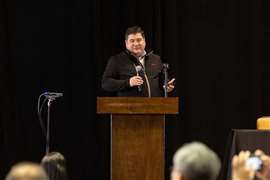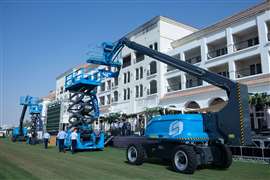Interviews with China's rental leaders
12 November 2012

China may be slow in developing a general equipment rental market like the west, but it has plenty of expansionary renters in markets like tower cranes and hoists. Murray Pollok reports.
Li Zhong says that if he didn’t believe in the future of the rental business in China he wouldn’t still be in it, or investing.
Mr Li is the main owner and founder of Beijing XYZ Co Ltd and a pioneer of aerial platform rental in China. He bought his first Genie machines in 1995 and now he has a fleet of 300 units in Beijing and Shanghai.
He draws an analogy between rental and the restaurant business; “People in China now have access to western foods”, he tells IRN, speaking through an interpreter, “but it’s hard for them to imagine how to eat in a western restaurant. Rental is like that.”
Nobody expects an explosion in rental in China, but for Mr Li there is enough business in renting lifts to construction and for maintenance at hotels, industry and shopping malls to justify what for China is a major expansion plan.
The company has just opened its third rental location, in Urumqi in the western province of Xingjiang, with an initial fleet of 20 scissors, and is now contemplating a move into crawler crane and power rentals.
The Urumqi opening is part of a strategy that will see the fleet expanded to around 500 units over the next two years. Apart from Urumqi, XYZ will also seek to deepen its presence in its existing Beijing and Shanghai markets with an additional 10 small, satellite depots to be opened over the next 12 months.
Half of these new locations will extend the coverage of the Beijing office to the Bohai Bay area, including Tianjin, and the other five will boost its presence in the ‘Yangtze Triangle' area around Shanghai.
In addition, Mr Li says XYZ is thinking about how to develop its rental business over the mid- to long-term. He says a move into new rental markets for either crawler cranes or power is likely by the end of this year, with the final choice of product determined by demand from customers.
Mr Li says this investment is taking place despite the slowdown in China's economy – and construction sector in particular - which has seen sales of construction equipment almost half from the peak in 2010. He says XYZ has the financial resources to invest and grow its business at a time when other businesses were conserving cash.
XYZ's rental fleet - split 90% scissors and 10% booms - comprises mainly Genie machines as well as a few Omme atrium lifts. More recently, however, Mr Li has been buying from Chinese manufacturer Mantall.
Much of the running in China’s rental market is being made by non-Chinese firms, such as Kanamoto’s joint venture in Shanghai, Hertz Equipment Rental Co – which now has four locations in the country – and Hong Kong’s Modern Equipment.
Mr Li says there is some evidence of more Chinese involvement in rental, but for the real action in rental in China you have to look to the tower crane and hoist sector.
One of the reasons for that is historical and the other relates to government regulation. Mr Jia, managing director of the Beijing –based Chinese rental association, who IRN met at his office, says crane and hoist rental originated in the early 90s when the government was making economic reforms.
As part of the reforms, contractors were urged to merge the fleets of equipment that they all used – tower cranes and hoists as well as concrete pumps – and manage their allocation more efficiently. Many of these fleets shifted to private ownership as the economic reforms deepened. Mr Jia says that of the 600 members of the association, around 67-70% are rental companies and of these the majority are now privately owned.
Why towers and hoists? Well, apart from their ubiquity on Chinese construction sites, they were also among the most regulated products from a safety perspective. This made it more attractive for contractors to rent in expertise in these products while retaining ownership of more ‘bread and buyer’ products such as earthmoving machines.
This process has now progressed to the stage that there are some very large rental companies who are actively consolidating the market. Mr Jia says this process is likely to continue, even if the slowdown in the economy has impacted on the financial health of many of these companies.
If rental growth was partly adopted as a result of regulation of the products, could the same thing happen to aerial platforms, for example? Mr Jia says there is no evidence yet that his members are moving into aerials rental, or earthmoving. The probably reflects the high level of demand for towers and hoists in recent years (although somewhat curtailed now) and the fact that aerials remain a ‘hard sell’ for the time being.
He does not see any big demand for earthmoving rentals, since these machines are relatively cheap to buy in China, and because there is already a very large number of small owner operators who help supply that market.
For the time being, Mr Jia is focused on helping his members weather the economic slowdown. Among other initiatives he is prompting them to establish their own brands – branding is a new concept to many of his members. Likewise, the association is in discussions with government about new legislation introduced recently in Beijing and Shanghai that provide tax incentives for contractors to buy machines. This isn’t helping the rental market, says Mr Jia.
One example of a tower crane rental company that has made the shift from contractor ownership to privately held rental firm is Shanghai-based China Nuclear Huaxing Tat Hong Machinery Construction Co Ltd (we will call it Huaxing Tat Hong).
Majority owned by Singapore-based Tat Hong – the crane and general rental company that also has major rental activities in Australia - Huaxing Tat Hong was originally owned by one of China’s large state owned contractors, China Nuclear Industry Construction Group. But since 2001 it has become one of the largest rental companies in China, with a fleet of 370 large-sized (>300 tm) towers. It operates mainly in south eastern China and its customers are in sectors including nuclear, high rise buildings, bridges, airports and petrochemicals.
Mr Gao Song, managing director and vice president of Huaxing Tat Hong, tells IRN that the future for his company is a good one, since rental remains a growth industry even if the market has slowed down.
Annual revenue increases of 20% to 30% are not unusual for the company and it is in the progress of investing further in the business, with an additional 120 tower cranes to be added over the next year. Mr Gao says investment in power stations and infrastructure projects continues – his company currently has an average of 20 towers working on each of four new nuclear plants under construction in Guangdong (at Taishan and YangJiang), Fujian Ningde and Dalian.
He makes a distinction between the many thousands of small tower crane companies who rent smaller cranes – and who he says are suffering – and company’s like his that are focused on heavy construction. Mr Gao thinks there are around 320000 tower cranes rented every year in China, and that if the market goes up or down by 50000 units it is still a massive market.
He points out also that Huaxing Tat Hong remains on good commercial terms with its former owner, which is still a major contractor in the country.
For Mr Gao, rental continues to grow at his end of the market because contractors are more interested in operating efficiently and because, unlike in the past, they can operate all over China. This means that they prefer to work with local rental companies rather than transporting their own cranes over vast distances in China. He also says that contractors, like their western counterparts, are now keener on investing their cash in core areas of the business rather than on equipment.
Testament to the growth opportunities is another privately owned Shanghai-based company, Shanghai Pangyuan Construction Equipment Rental (Pangyuan), which is the first Chinese company to enter IRN’s IRN100 list – at number 90 in this year’s survey.
Mr Cai Zhao Yi, Pangyuan’s managing director, chairman and major shareholder, says the company originated as a dealer for tower crane manufacturer Sichuan Construction Machines (SCM), but switched to rental after the recession in 1999 because more and more clients were requesting rental.
Pangyuan’s success also helps explain why tower cranes and hoists are such popular rental products in China. Mr Cai says they tried to rent concrete equipment as well, but found it to be an over-populated, low price market. In contrast, tower cranes require specialist back up and expertise with higher barriers to entry, making it a more attractive rental business.
That logic is also what lies behind the company’s move into crawler cranes in 2010 – it now has a fleet or around 24 crawlers including 650 t giants from Sany and Zoomlion.
The company’s fleet comprises around 1210 towers (the average size is 200 tm) and a further 570 construction hoists. It operates from 80 depots throughout China, and the fleet comprises mainly Zoomlion and Potain towers and Baoda, GJJ and Zoomlion hoists.
Mr Cai tells IRN that the company didn’t grow quickly until 2009 when it gained some inward investment that allowed it to expand, including the acquisition of 10 competitors, including one or two major players. After that it has been 50% plus annual growth rates.
Like Mr Gao at Tat Hong, Mr Cai says that despite the slowdown there remains a big market in China, with Pangyuan still with a less than 2% market share. With sales of €77 million in 2011 that would translate into a Chinese tower crane rental market value of more than €3.5 billion, a startling figure.
He makes a good argument for continued growth of China’s rental market, pointing out that while Shanghai and Beijing high rise markets have slowed down, the massive urbanization in China continues. He says he visits small towns and cities in China’s hinterland and sees more towers than he would see in Europe in 20 days.
He predicts that Pangyuan will not be the only Chinese rental company in the IRN100 for long, and thinks that, in time, big rental companies focusing on roadbuilding or earthmoving equipment will come. He believes Pangyuan’s example – of growing from RMB80 million revenues four years ago to RMB800 million now – will be repeated by others.
The timing of all this rental growth is, of course, impossible to predict. But Mr Cai is a bit like XYZ’s Li Zhong, if he didn’t believe in rental, he wouldn’t be investing in it. He’s not alone.
BOX STORY
Ritchie Bros closes in on first China auction
Ritchie Bros Auctioneers remains on course to hold its first auction in China early in 2013 with regulatory approvals moving forward and an auction site in Beijing being lined up.
Chris Edwards, Ritchie's representative in China, told IRN that the company had just received its temporary registration as a wholly foreign owned auction company, the first in China. This does not allow the company to hold auctions, but it paves the way to full registration, with final statutory filings now being completed.
The date of the auction will be announced at the Bauma China exhibition in November, but Mr Edwards, speaking to IRN at Ritchie's Chinese head office in Beijing, said it would be held in early 2013.
A temporary auction site will be developed at the Tian Zhu free trade zone next to Beijing's international airport. Free trade zone status will make it easier for foreign buyers to export machines out of China after the auction.
Mr Edwards said the timing remained very good for the launch of a construction equipment auction business in China, with the significant downturn in the market meaning that OEMs and dealers have excess inventories of used machines that they need to sell.
"The downturn over the last 12 to 18 months has put huge pressure on fleet owners, dealers, OEMs and finance companies. They are overwhelmed with non-performing equipment", said Mr Edwards, "Hopefully, more so than ever, our model is exactly what is needed. They are in a situation where they need this - they need another options for used equipment."






